新译林版九年级上册第三单元宾语从句小结
牛津译林九年级上学期英语知识点汇总-Unit3
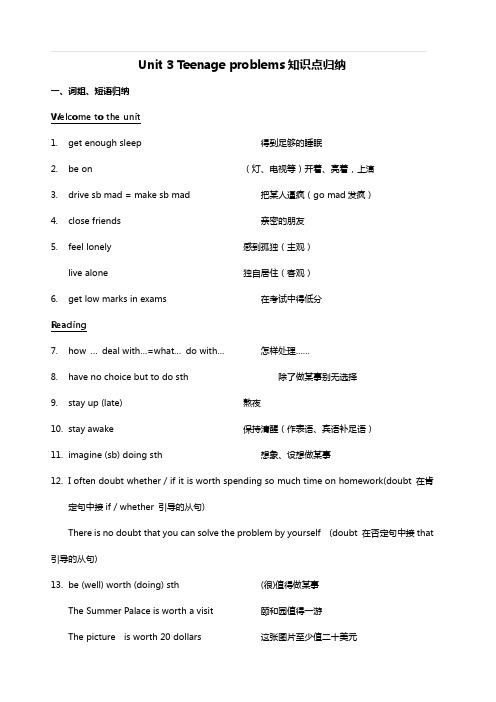
Unit 3 Teenage problems知识点归纳一、词组、短语归纳Welcome to the unit1.get enough sleep 得到足够的睡眠2.be on (灯、电视等)开着、亮着,上演3.drive sb mad = make sb mad 把某人逼疯(go mad发疯)4.close friends 亲密的朋友5.feel lonely 感到孤独(主观)live alone 独自居住(客观)6.get low marks in exams 在考试中得低分Reading7.how …deal with…=what…do with…怎样处理……8.have no choice but to do sth 除了做某事别无选择9.stay up (late) 熬夜10.stay awake 保持清醒(作表语、宾语补足语)11.imagine (sb) doing sth 想象、设想做某事12.I often doubt whether / if it is worth spending so much time on homework(doubt 在肯定句中接if / whether 引导的从句)There is no doubt that you can solve the problem by yourself (doubt 在否定句中接that 引导的从句)13.be (well) worth (doing) sth (很)值得做某事The Summer Palace is worth a visit 颐和园值得一游The picture is worth 20 dollars 这张图片至少值二十美元The book is well worth reading /It's well worth reading the book.这本书很值得一读。
14.so that 以便,为了(引导目的状语从句,从句中常用情态动词)so + adj /adv + that 如此…以至于…(引导结果状语从句)15.offer sb. sth. = offer sth. to sb. 为某人提供某物16.provide sb with sth = provide sth for sb 为某人提供某物17.offer sb some suggestions/ advice= offer some suggestions to me18.offer to do sth 主动提出做某事19.hear from sb.(短暂性动作)= get/receive a letter from sb.(短暂性动作)=have a letter from sb.(延续性动作)收到某人来信20.be crazy about…对…..很着迷21.my love of football 我对足球的热爱22.the cause of ……的原因23.get into trouble 陷入麻烦24.allow sb to do sth 允许某人做某事25.be strict with sb 对某人要求严格be strict in sth 对某事要求严格26.develop our hobbies 培养我们的爱好27.stay out late 呆在外面很晚28.achieve a balance 获得平衡29.valuable advice 宝贵的建议(adj只能修饰物,不能修饰人, value ,n价值)30.make a list of…列一个…..清单31.work out 算出,解决,制定出…..(代词放中间)32.according to 根据(介词短语),据……所说33.my advice is worth taking 我的建议值得采纳34.take /follow one's advice 接受/采纳某人的建议35.It seems/seemed that 似乎,好像36.It is better for you to go home earlier 你最好早点回家37.= You’d better go home earlier38.forget about sth. 忘记有关…的事Grammar and Integrated Skills and Study Skills39.need /keep silence 需要安静/ 保持安静(silence ,n ---silentadj 寂静的)40.need someone to share my worries 需要有人分担我的忧愁41.solve the problem 解决问题42.ask for help 寻求帮助43.youth worker 青少年工作者44.thank you for your reply (n) 感谢你的回复45.reply to my letter (v)= answer my letter 回复我的信answer the door / the telephone (只能用answer)ugh at 嘲笑47.make progress 取得进步(不可数名词)48.all her bookworm 叫她书虫49.make progress( in) (在……方面)取得进步50.go over 复习,回顾51.as often as possible 尽可能经常地52.read English aloud 大声朗读英语53.pronounce all the words correctly 准确地发所有单词的音(v)54.learn correct pronunciation 学习正确的发音(n)55.Don’t mention it 不客气Task56.pay (no) attention to sb (不)注意某人57.keep your worries to yourself 把担忧留给自己58.be unhappy with 对……不满意59.many students of our age 我们这个年龄的许多学生60.care too much about your marks 太在意你的分数Useful sentences:61.What's wrongs Eddie? 怎么了,埃迪?62.Perhaps you should manage your time better and go to bed earlier.或许你应该更好地安排你的时间,早点睡觉。
九年级unit 3知识点总结

九年级unit 3知识点总结Unit 3 知识点总结Unit 3 是九年级英语课程中的一个重要单元,本文将对该单元的知识点进行总结。
内容包括:名词性从句、情态动词、宾语从句、反意疑问句以及其他相关语法知识和常用短语。
一、名词性从句名词性从句是句子中用作名词的从句,可以充当主语、宾语、表语和同位语。
常见的引导词有:that, whether, if, who, whom, whose, what, which等。
名词性从句往往由以下句式构成:1. 主语从句:What he said is true.2. 宾语从句:I am not sure if/whether he will come.3. 表语从句:The question is who will go with us.4. 同位语从句:The news that he passed the exam is exciting.二、情态动词情态动词用于表示说话人对某种行为或状态的态度、意愿、能力等。
常见的情态动词有:can, could, may, might, must, shall, should, will, would等。
1. 表示能力和允许:can, could, may, might- They can swim very well.- Could I borrow your pen, please?- May I go to the restroom?2. 表示推测和猜测:must, may, might- He must be at home. I saw his car outside.- It may rain tomorrow. Take an umbrella with you.- He might not have heard the news yet.3. 表示义务和建议:must, should, ought to- You must finish your homework before going out to play.- You should/ought to apologize to him for your mistake.4. 表示将来:shall, will- I shall/will come to see you tomorrow.三、宾语从句宾语从句在句子中作为动词的宾语。
新译林版英语九年级上册Unit3重点词组及句子归纳含答案
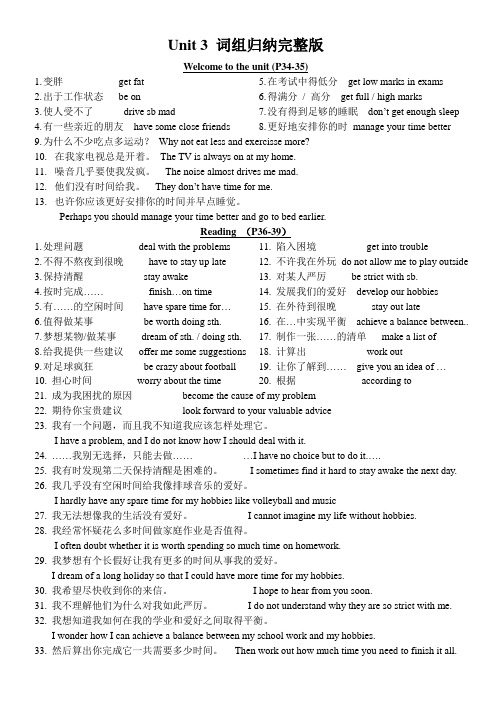
Unit 3 词组归纳完整版Welcome to the unit (P34-35)1.变胖get fat2.出于工作状态be on3.使人受不了drive sb mad4.有一些亲近的朋友have some close friends5.在考试中得低分get low marks in exams6.得满分/ 高分get full / high marks7.没有得到足够的睡眠don’t get enough sleep8.更好地安排你的时manage your time better9.为什么不少吃点多运动?Why not eat less and exercisse more?10.在我家电视总是开着。
The TV is always on at my home.11.噪音几乎要使我发疯。
The noise almost drives me mad.12.他们没有时间给我。
They don’t have time for me.13.也许你应该更好安排你的时间并早点睡觉。
Perhaps you should manage your time better and go to bed earlier.Reading (P36-39)1.处理问题deal with the problems2.不得不熬夜到很晚have to stay up late3.保持清醒stay awake4.按时完成…… finish…on time5.有……的空闲时间have spare time for…6.值得做某事be worth doing sth.7.梦想某物/做某事dream of sth. / doing sth.8.给我提供一些建议offer me some suggestions9.对足球疯狂be crazy about football10.担心时间worry about the time 11.陷入困境get into trouble12.不许我在外玩do not allow me to play outside13.对某人严厉be strict with sb.14.发展我们的爱好develop our hobbies15.在外待到很晚stay out late16.在…中实现平衡achieve a balance between..17.制作一张……的清单make a list of18.计算出work out19.让你了解到……give you an idea of …20.根据according to21.成为我困扰的原因become the cause of my problem22.期待你宝贵建议look forward to your valuable advice23.我有一个问题,而且我不知道我应该怎样处理它。
译林版英语九年级上册_语法透析:宾语从句

语法透析:宾语从句一、宾语从句连接代词who, whom, whose, what, which和连接副词when, where, why, how 等连接的宾语从句,它们在句中即有连接从句的作用,又在句中充当句子的成分。
例:1. 连接代词who, whom, whose, what, which在句中充当主语、宾语、定语或者表语。
如:Do you know which film they are talking about? (which做定语)2. 连接副词when, where, why, how在句中充当状语。
如:I don’t know where he lives. (where 做地点状语)二、宾语从句的语序,宾语从句的语序必须是陈述语序,既:连接代词/副词+主语+谓语+其他成分。
例:I don’t know what they are looking for.Could you tell me when the train will leave?Can you image what kind of man he is?三、宾语从句的时态。
宾语从句的时态受主句的限制,①主句是一般现在时态,从句根据实际情况而定。
②主句是一般过去时态,从句用相应的过去的时态。
如果从句的动作发生在主句之前,则从句要用过去完成时态。
③如果从句的动作发生在主句之前,则从句要用过去完成时态。
例:1)She says that she is a student.She said that she was a student.2)She says that she will fly to Japan in a week.She said that she would fly to Japan in a week.3)She says that she has finished her homework already.She said that she had finished her homework already.4)She says that she can sing a song in English.She said that she could sing a song in English.【注意】1.如果宾语从句说的是客观真理、自然现象或事实时,这时宾语从句要用一般现在时态。
Unit3知识梳理宾语从句讲义牛津译林版英语九年级上册
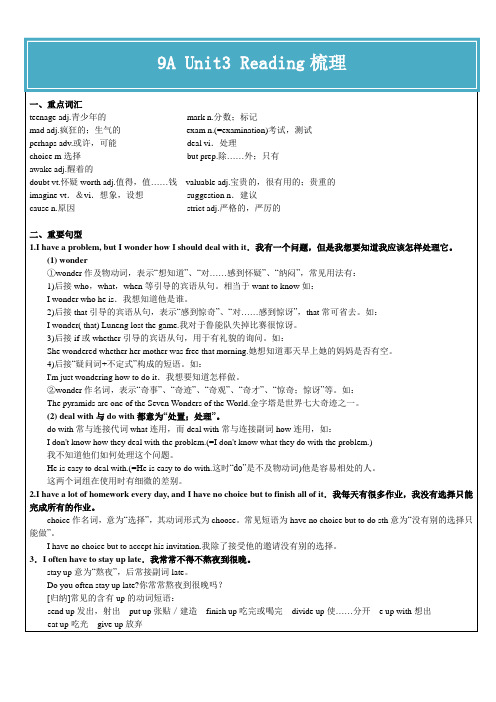
A. allowed
B. promised
C. accepted
D. spared
(
)13. —What did the doctor say just now?
—The doctor suggested that we shouldn’t _______ late even on holiday.
9A Unit3 Reading 梳理
一、重点词汇 teenage adj.青少年的 mad adj.疯狂的;生气的 perhaps adv.或许,可能 choice m 选择 awake adj.醒着的 doubt vt.怀疑 worth adj.值得,值……钱 imagine vt.&vi.想象,设想 cause n.原因
A. what to do it
B. how to do it C. where to do D. when to do
(
)3. David was so excited at the good news that he could ______say a word.
A. nearly
B. hard
5.I often doubt whether it is worth spending so much time on my homework.我常常怀疑把这么多时间花费在作业上 是否值得。
(1) doubt 意为“怀疑”。 后接宾语从句时,如主句为肯定句时用 if 或 whether 连接,如主句为否定句或疑问句时用 that 连接,表示“不信 任,不相信,怀疑,疑惑”。如: I don't doubt that she's telling the truth.我并不怀疑她讲的是真话。 (2) worth 为形容词,意为“值得;值……钱”,常见短语为 be worth doing“值得做”。 The Life I Know, by Han Han is worth reading. 韩寒写的《我所理解的生活》值得读。 6.I don't understand why they were so strict with me.我不理解为什么他们对我如此的严格。 strict 作形容词,意为“严格的;严厉的”。常见短语 be strict with sb,意为“对某人严格要求”,以及 be strict in( doing) sth,意为“对(做)某事严格要求”。如: Mr Smith is very strict with his children.史密斯先生对他的孩子们要求十分严格。 7.I need someone to share my worries with.我想要一个人来和我分担忧虑。 worry: (1)worry 作名词,意为“担心;令人担忧的事情”,其复数形式为 worries。 Too many worries are bad for your health.太多的忧虑对你的健康有害。 (2) worry 可作及物动词,意为“使烦恼”,“使焦虑”,常接 sb 作宾语。如: What worried you so much?什么事使你这么着急? (3) worry 也可作不及物动词,意为“烦恼”、“担心”、“发愁”,常跟介词 about 或 over。如: They are worrying about the ing exam.他们正在为即将到来的考试而发愁。 (4) worry 后接从句时,也表示“为……担心”,此时不用介词,worry 可看作及物动词。如: Don't worry how much you 'spend.别担心花多少钱。
牛津译林版九年级英语上册Unit 3单元知识点总结

牛津译林版九年级英语上册Unit 3 Teenage problems知识点总结一、有关青少年问题的相关内容1. Some common teenage problems●getting too many tests and exams ●not having enough sleep●too noisy home ●no communication with family members ●having no close friends●feel tired in class2. How to solve the problems●solve by yourself●ask somebody else for help 二、短语总结from time to time(P.42)deal with(P.42)make a lot of noise(P.43)hand in(P.44)on time(P.44)offer sb. some suggestions(P.44) be of great value(P.44)hear from sb. (P.44)be crazy about(P.45)plenty of(P.45)stay out late(P.45)get into trouble(P.45)make a list of(P.47)the next day(P.47)tell the truth(P.50)quarrel with(P.50)reply to(P.55)suffer from(P.56)keep fit(P.59)三、重点词汇与句型1. reply/answerreply (n.&v.) reply to(sb. /sth. )answer(n.&vt.) answer (sb. /sth. )2. considerconsider +名词/代词/动名词。
Units2-3语法讲义宾语从句提建议的句型牛津译林版九年级英语上册
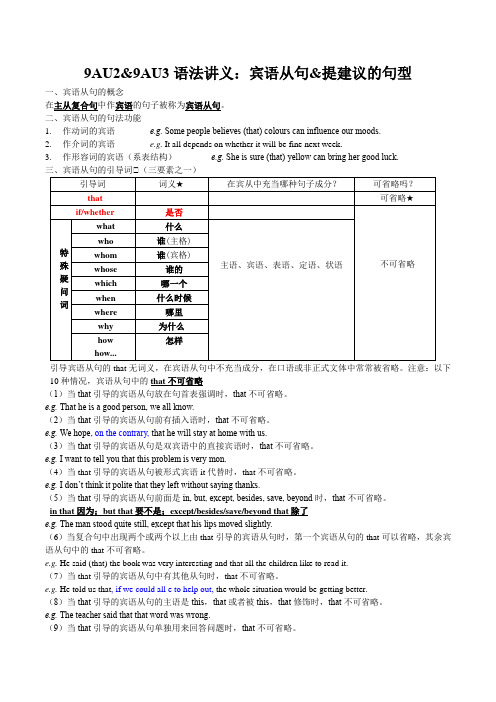
9AU2&9AU3语法讲义:宾语从句&提建议的句型一、宾语从句的概念在主从复合句中作宾语的句子被称为宾语从句。
二、宾语从句的句法功能1.作动词的宾语 e.g. Some people believes (that) colours can influence our moods.2.作介词的宾语 e.g. It all depends on whether it will be fine next week.3.作形容词的宾语(系表结构) e.g. She is sure (that) yellow can bring her good luck.三、宾语从句的引导词★(三要素之一)引导宾语从句的that无词义,在宾语从句中不充当成分,在口语或非正式文体中常常被省略。
注意:以下10种情况,宾语从句中的that不可省略(1)当that引导的宾语从句放在句首表强调时,that不可省略。
e.g. That he is a good person, we all know.(2)当that引导的宾语从句前有插入语时,that不可省略。
e.g. We hope, on the contrary, that he will stay at home with us.(3)当that引导的宾语从句是双宾语中的直接宾语时,that不可省略。
e.g. I want to tell you that this problem is very mon.(4)当that引导的宾语从句被形式宾语it代替时,that不可省略。
e.g. I don’t think it polite that they left without saying thanks.(5)当that引导的宾语从句前面是in, but, except, besides, save, beyond时,that不可省略。
in that因为;but that要不是;except/besides/save/beyond that除了e.g. The man stood quite still, except that his lips moved slightly.(6)当复合句中出现两个或两个以上由that引导的宾语从句时,第一个宾语从句的that可以省略,其余宾语从句中的that不可省略。
Unit 3 Grammar 知识点整理 牛津译林版英语九年级上册讲义 (含答案)
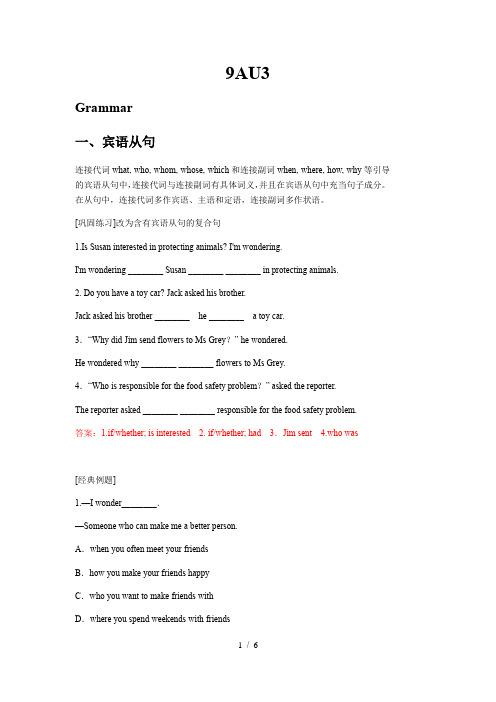
9AU3Grammar一、宾语从句连接代词what, who, whom, whose, which和连接副词when, where, how, why等引导的宾语从句中,连接代词与连接副词有具体词义,并且在宾语从句中充当句子成分。
在从句中,连接代词多作宾语、主语和定语,连接副词多作状语。
[巩固练习]改为含有宾语从句的复合句1.Is Susan interested in protecting animals? I'm wondering.I'm wondering ________ Susan ________ ________ in protecting animals.2. Do you have a toy car? Jack asked his brother.Jack asked his brother ________ he ________ a toy car.3.“Why did Jim send flowers to Ms Grey?” he wondered.He wondered why ________ ________ flowers to Ms Grey.4.“Who is responsible for the food safety problem?” asked the reporter.The reporter asked ________ ________ responsible for the food safety problem.答案:1.if/whether; is interested 2. if/whether; had3.Jim sent 4.who was[经典例题]1.—I wonder________.—Someone who can make me a better person.A.when you often meet your friendsB.how you make your friends happyC.who you want to make friends withD.where you spend weekends with friends2.I never doubt ________________________.A. that Gulliver in Lilliput is worth readingB. whether Gulliver in Lilliput is worth readingC. if Gulliver in Lilliput is worth reading itD. that Gulliver in Lilliput is worth being reading3.Tom asks _______ after he finishes his project.A. whether can he go to the cinemaB.whether he can go to the cinemaC. that he can go to the cinemaD.that can he go to the cinema4.—Have you ever seen the film The taking of Tiger Mountain?—Yes. And I believe ________ it was the best film in 2014.A.thatB. whatC. howD. if5.—Excuse me, I wonder _______ the plane can land on time.—Wait a minute, please. Let me check it out.A.ifB. whichC. thatD. who答案:CABAA6.This morning my mother asked me ________.A.why he is not hereB. where Julia went last weekendC.what time it isD. how did my brother do it7.-What did Max just say to you?-He asked me_____________.A.If I would like to go skatingB.when did I buy this CDC.where I will spend the weekendD.that I had a good time8.--Bob,please tell me ___________. --In south Hill School.A.where will the match be heldB.where the match will be heldC.when will the match be heldD.when the match will be held9.I know he's been curious about everything, but that's__________. Be patient!A. what do kids likeB. what kids likeC. what are kids likeD. what kids are like10.-Peter, is there anything else you want to know about colours?- Yes, I am still wondering_______ .A.why do strong colours make people take action easilyB.that there is a relationship between colours and moods’C.whether colours can change our moods and improve our lifeD.what do different colours represent and how do they influence us答案:BABDC11.—Can you tell me________yesterday?—It was given by Mrs King.A. whom the speech was givenB. whom gave the speechC. who gave the speechD. who the speech gave by12.—We are in trouble now. I have no idea .—Neither do I. We have to ask for help.A. how can the problem be solvedB. how the problem can be solvedD. how the problem can solve13.—Could you please tell me________?—Sorry,I’m new here.A.where the airport wasB.where was the airportC.where the airport isD.where is the airport14.They have no idea at all_________or not.A. if has he gone to BeijingB.whether has he gone to BeijingC.if he has gone to BeijingD.whether he has gone to Beijing15.Could you tell me ________ a meeting in Guangzhou next week?A. if there was going to beB. if there is going to beC. whether is there going to beD. whether there is going to have 答案:CBCDB二、表示建议的句型1.Shall I(we) do...?2.Let’s do...3.How/What about doing...?4.Why not/Why don’t you do...?[经典例题]1.—Do you really think wearing yellow can bring good luck?—Well, I am not sure. But________ have a try?A. why don’tB. why not youC. what aboutD. why not2.—Could you tell me some information about the hotels in your country?—Why not________on the Internet?A.look for itB.to look for itC.to look it upD.look it up3._______ give up smoking.A. Shall weB. Why don’t youC. What aboutD. Perhaps you should4.It’s too hot. How about______ swimming this afternoon?A. goB. to goC. goingD. goes5.—Mum, I've caught a bad cold. I'm not feeling well.—________ take this medicine, dear? It will make you feel better.A.Shall we B.Why notC.Let's D.Why don't答案:DDDCB【知识梳理1】I need silence when I'm studying. (P40)当我学习时我需要安静。
[译林版]九年级物理宾语从句讲义
![[译林版]九年级物理宾语从句讲义](https://img.taocdn.com/s3/m/1c930795370cba1aa8114431b90d6c85ed3a8872.png)
[译林版]九年级物理宾语从句讲义一、宾语从句的定义宾语从句是在句子中充当宾语的从句。
宾语从句通常由连接词引导,常见的连接词有:that, whether, if, when, where, why, how等。
二、宾语从句的类型1. 陈述句宾语从句:宾语从句用陈述句语序,连接词通常为that。
例如:陈述句宾语从句:宾语从句用陈述句语序,连接词通常为that。
例如:- I know that he is a good student.that he is a good student.2. 一般疑问句宾语从句:宾语从句用一般疑问句语序,连接词通常为whether或if。
例如:一般疑问句宾语从句:宾语从句用一般疑问句语序,连接词通常为whether或if。
例如:- Do you know whether he will go with us?whether he will go with us?3. 特殊疑问句宾语从句:宾语从句用特殊疑问句语序,连接词为特殊疑问词。
例如:特殊疑问句宾语从句:宾语从句用特殊疑问句语序,连接词为特殊疑问词。
例如:- I don't know when he will arrive.when he will arrive.- Can you tell me why he is late?why he is late?三、宾语从句的注意事项1. 连接词that在口语中通常可以省略,但在有重要强调时一般不省略。
2. 特殊疑问词引导的宾语从句中,特殊疑问词本身不可省略。
3. 宾语从句的谓语动词的时态应与主句谓语动词的时态一致。
4. 宾语从句中的人称、物主代词和指示代词要根据具体情况进行变化。
四、宾语从句的示例1. 陈述句宾语从句:- She said that she had finished her homework.that she had finished her homework.2. 一般疑问句宾语从句:- Do you know if he will join us?if he will join us?- I wonder whether they have arrived.whether they have arrived.3. 特殊疑问句宾语从句:- Can you tell me where she lives?where she lives?- I don't know how to solve this problem.how to solve this problem.以上是关于九年级物理宾语从句的讲义。
新译林版九年级上册第三单元语言点详解
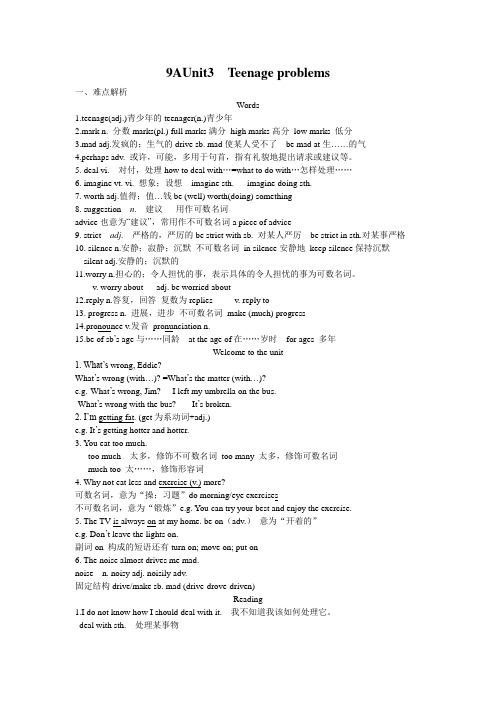
9AUnit3 Teenage problems一、难点解析Words1.teenage(adj.)青少年的teenager(n.)青少年2.mark n. 分数marks(pl.) full marks满分high marks高分low marks 低分3.mad adj.发疯的;生气的drive sb. mad使某人受不了be mad at生……的气4.perhaps adv. 或许,可能,多用于句首,指有礼貌地提出请求或建议等。
5. deal vi. 对付,处理how to deal with…=what to do with…怎样处理……6. imagine vt. vi. 想象;设想imagine sth. imagine doing sth.7. worth adj.值得;值…钱be (well) worth(doing) something8. suggestion n. 建议用作可数名词advice也意为“建议”,常用作不可数名词a piece of advice9.strict adj. 严格的,严厉的be strict with sb. 对某人严厉be strict in sth.对某事严格10. silence n.安静;寂静;沉默不可数名词in silence安静地keep silence保持沉默silent adj.安静的;沉默的11.worry n.担心的;令人担忧的事,表示具体的令人担忧的事为可数名词。
v. worry about adj. be worried about12.reply n.答复,回答复数为replies v. reply to13. progress n. 进展,进步不可数名词make (much) progress14.pronounce v.发音pronunciation n.15.be of sb’s age与……同龄at the age of在……岁时for ages 多年Welcome to the unit1. What’s wrong, Eddie?What’s wrong (with…)? =What’s the matter (with…)?e.g.-What’s wrong, Jim? -I left my umbrella on the bus.-What’s wrong with the bus? -It’s broken.2. I’m getting fat. (get为系动词+adj.)e.g. It’s getting hotter and hotter.3. You eat too much.too much 太多,修饰不可数名词too many 太多,修饰可数名词much too 太……,修饰形容词4. Why not eat less and exercise (v.) more?可数名词,意为“操;习题”do morning/eye exercises不可数名词,意为“锻炼”e.g. You can try your best and enjoy the exercise.5. The TV is always on at my home. be on(adv.)意为“开着的”e.g. Don’t leave the lights on.副词on 构成的短语还有turn on; move on; put on6. The noise almost drives me mad.noise n. noisy adj. noisily adv.固定结构drive/make sb. mad (drive-drove-driven)Reading1.I do not know how I should deal with it. 我不知道我该如何处理它。
新译林版英语九年级上册宾语从句
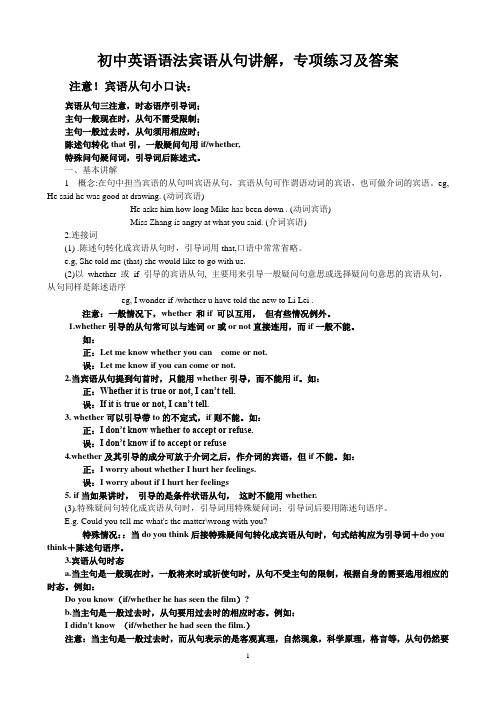
初中英语语法宾语从句讲解,专项练习及答案注意!宾语从句小口诀:宾语从句三注意,时态语序引导词;主句一般现在时,从句不需受限制;主句一般过去时,从句须用相应时;陈述句转化that引,一般疑问句用if/whether,特殊问句疑问词,引导词后陈述式。
一、基本讲解1概念:在句中担当宾语的从句叫宾语从句,宾语从句可作谓语动词的宾语,也可做介词的宾语。
eg, He said he was good at drawing. (动词宾语)He asks him how long Mike has been down . (动词宾语)Miss Zhang is angry at what you said. (介词宾语)2.连接词(1) .陈述句转化成宾语从句时,引导词用that,口语中常常省略。
e.g, She told me (that) she would like to go with us.(2)以whether 或if 引导的宾语从句, 主要用来引导一般疑问句意思或选择疑问句意思的宾语从句,从句同样是陈述语序eg, I wonder if /whether u have told the new to Li Lei .注意:一般情况下,whether 和if 可以互用,但有些情况例外。
1.whether引导的从句常可以与连词or或or not直接连用,而if一般不能。
如:正:Let me know whether you can come or not.误:Let me know if you can come or not.2.当宾语从句提到句首时,只能用whether引导,而不能用if。
如:正:Whether it is true or not, I can’t tell.误:If it is true or not, I can’t tell.3. whether可以引导带to的不定式,if则不能。
新译林版初中英语九年级上册全册单元知识点归纳
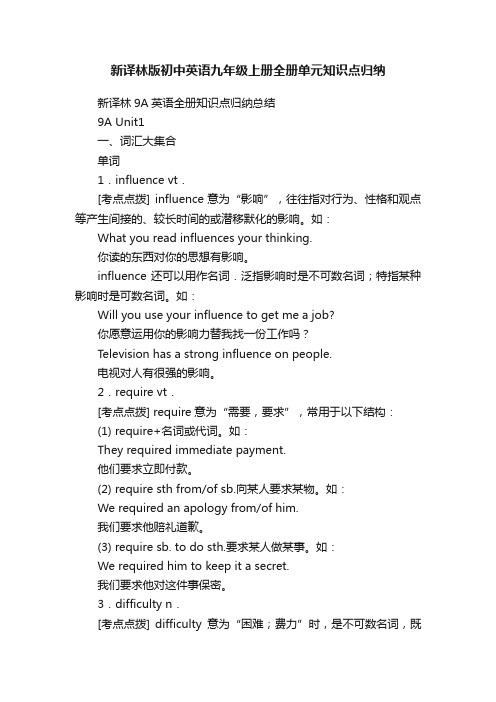
新译林版初中英语九年级上册全册单元知识点归纳新译林9A英语全册知识点归纳总结9A Unit1一、词汇大集合单词1.influence vt.[考点点拨] influence意为“影响”,往往指对行为、性格和观点等产生间接的、较长时间的或潜移默化的影响。
如:What you read influences your thinking.你读的东西对你的思想有影响。
influence还可以用作名词.泛指影响时是不可数名词;特指某种影响时是可数名词。
如:Will you use your influence to get me a job?你愿意运用你的影响力替我找一份工作吗?Television has a strong influence on people.电视对人有很强的影响。
2.require vt.[考点点拨] require意为“需要,要求”,常用于以下结构:(1) require+名词或代词。
如:They required immediate payment.他们要求立即付款。
(2) require sth from/of sb.向某人要求某物。
如:We required an apology from/of him.我们要求他赔礼道歉。
(3) require sb. to do sth.要求某人做某事。
如:We required him to keep it a secret.我们要求他对这件事保密。
3.difficulty n.[考点点拨] difficulty意为“困难;费力”时,是不可数名词,既不能与不定冠词连用,也不能以复数形式出现。
其形容词为difficult,意为“困难的”。
have difficulty (in)doing sth.做某事有困难;have difficulty with sth.做某事困难。
如:I have great difficulty in finishing the work by myself.我独自完成这项工作有很大困难。
Unit2Unit3Grammar宾语从句语法复习牛津译林版九年级英语上册

牛津译林版9A Unit 2-Unit 3 Grammar 宾语从句语法复习(一)由that,if或whether引导的宾语从句在复合句中,充当宾语的从句叫宾语从句。
一、由that引导的宾语从句1.that可以引导宾语从句,此时从句部分相当于一个陈述句。
that无词义,在从句中不充当成分,在口语或非正式文体中常省略。
宾语从句可跟在主句动词(know,think,believe,hope,mean,wish,say等)或主句形容词(afraid,certain,sure,glad,sorry 等)之后。
▶I believe (that) you are a person of god character.我认为你是一个具有优秀品质的人。
▶I hope (that) she will become a wonderful woman just like her mother.我希望她将成为一个像她母亲一样了不起的女性。
▶I am afraid (that) I will lose this important match.恐怕我会输掉这场重要的比赛。
▶I am glad (that) you can come for dinner.我很开心你能来吃晚餐。
【特别提醒】在以下情况下,that不可省略。
(1)当宾语从句的主语是that 时。
▶He says that that is a real golden necklace.他说那是一条真的黄金项链。
(2)当宾语从句前有插入语时。
▶He says, for example, that he is interested in Maths.他说,例如他对数学感兴趣。
2.由that 引导的宾语从句的否定形式当主句的主语是第一人称(I,we),而且谓语动词是think,guess,believe,suppose,expect等时,如果从句要表达否定含义,则否定只能体现在主句的谓语动词上面,这种情况叫作否定前移。
牛津译林版九年级英语上册Unit3知识点归纳汇总

牛津译林版九年级英语上册Unit3知识点归纳汇总短语teenage problems 青少年问题drive sb mad使人受不了deal with处理,对付stay up熬夜be worth doing sth 值得做某事offer me some suggestions 给我提供一些建议be strict with sb 对某人要求严格achieve a balance between...and....在…….和.…之间取得平衡according to 根据pay no attention to..无视……go over复习;回顾be proud of...为……感到自豪be of sb's age 和……同龄的be on(电器等)开着feel lonely感觉孤独have no choice but to do...除了做……之外别无选择work out算出;解决dream of/about梦想;想象allow sb to do sth允许某人做某事stay out待在户外;(晚上)不回家laugh at嘲笑make progress取得进步don't mention it不客气keep it to yourself把它藏在心里care too much about...对……关注太多句型1.Why not+do为何不…例:Why not eat less and exercise more?为何不少吃点,多锻炼呢?2.What/How about doing sth?做.…….怎么样?例:What about choosing your hobby according to the time you have?根据你拥有的时间去选择你的爱好如何?3.be worth doing sth值得做某事例:I often doubt whether it is worth spending so much time on homework.我常常怀疑是否值得花这么多时间在家庭作业上。
新译林版英语九年级上册第三单元语法写作指导

1. 宾语从句(二)在前面我们学习了由that、if 或whether 引导的宾语从句,本期我们学习由“wh-word”引导的宾语从句。
wh-word引导的宾语从句通常是一个表示特殊疑问语气的句子,而且wh-word引导的宾语从句的语序为陈述句语序。
wh-word在句子中有具体的意思,因此不可以省略。
例如:①“Why does your father go to work on foot every day?”Millie asks me.→Millie asks me why my father goes to work on foot every day.②“What will you do in the future?”Simon asks me.→Simon asks me what I will do in the future.③Amy wonders, “Whom can I trust?”→Amy wonders whom she can trust.④My brother asked me, “Where did you buy this book?”→My brother asked me where I had bought that book.⑤“How can I improve my writing skills?”Li Mei wonders.→Li Mei wonders how she can improve her writing skills.⑥“Which sweater do you like best?”the shopkeeper asked me.→The shopkeeper asked me which sweater I liked best.【注意】当who 在宾语从句中作主语时,宾语从句的语序与原特殊疑问句的语序相同。
例如:“Who is your best friend in your class?” my father asks me.→My father asks me who is my best friend in my class.2. 表示提建议的表达在英语中,表示提建议的表达有很多,常见的有Why not ...、Why don’t you ...、What / How about ...、Let’s ...、Shall we ...等。
【初中要点】九年级上学期英语unit3核心语法:牛津译林版
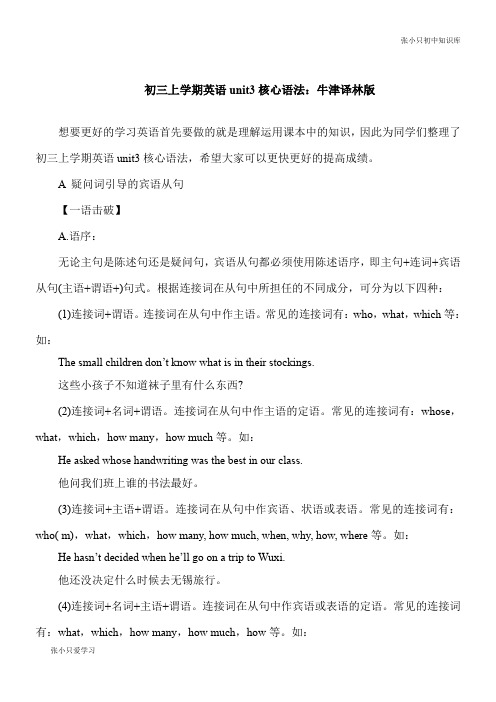
张小只初中知识库张小只爱学习初三上学期英语unit3核心语法:牛津译林版想要更好的学习英语首先要做的就是理解运用课本中的知识,因此为同学们整理了初三上学期英语unit3核心语法,希望大家可以更快更好的提高成绩。
A 疑问词引导的宾语从句【一语击破】A.语序:无论主句是陈述句还是疑问句,宾语从句都必须使用陈述语序,即主句+连词+宾语从句(主语+谓语+)句式。
根据连接词在从句中所担任的不同成分,可分为以下四种:(1)连接词+谓语。
连接词在从句中作主语。
常见的连接词有:who,what,which等:如:The sm all children don’t know what is in their stockings.这些小孩子不知道袜子里有什么东西?(2)连接词+名词+谓语。
连接词在从句中作主语的定语。
常见的连接词有:whose,what,which,how many,how much等。
如:He asked whose handwriting was the best in our class.他问我们班上谁的书法最好。
(3)连接词+主语+谓语。
连接词在从句中作宾语、状语或表语。
常见的连接词有:who( m),what,which,how many, how much, when, why, how, where等。
如:He hasn’t decided when he’ll go on a trip to Wuxi.他还没决定什么时候去无锡旅行。
(4)连接词+名词+主语+谓语。
连接词在从句中作宾语或表语的定语。
常见的连接词有:what,which,how many,how much,how等。
如:。
译林版九年级英语宾语从句的语序用法
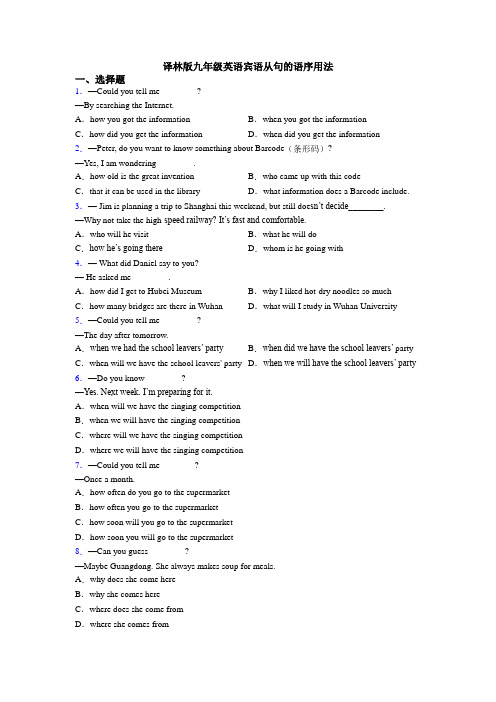
译林版九年级英语宾语从句的语序用法一、选择题1.—Could you tell me________ ?—By searching the Internet.A.how you got the information B.when you got the informationC.how did you get the information D.when did you get the information 2.—Peter, do you want to know something about Barcode(条形码)?—Yes, I am wondering ________.A.how old is the great invention B.who came up with this codeC.that it can be used in the library D.what information does a Barcode include. 3.— Jim is planning a trip to Shanghai this weekend, but still doe sn’t decide________. —Why not take the high-speed railway? It’s fast and comfortable.A.who will he visit B.what he will doC.how he’s going there D.whom is he going with4.— What did Daniel say to you?— He asked me ________.A.how did I get to Hubei Museum B.why I liked hot-dry noodles so much C.how many bridges are there in Wuhan D.what will I study in Wuhan University 5.—Could you tell me ________?—The day after tomorrow.A.when we had the school leavers’ party B.when did we have the school leavers’ party C.when will we have the school leavers' party D.when we will have the school leavers’ party 6.—Do you know ________?—Yes. Next week. I’m preparing for it.A.when will we have the singing competitionB.when we will have the singing competitionC.where will we have the singing competitionD.where we will have the singing competition7.—Could you tell me________?—Once a month.A.how often do you go to the supermarketB.how often you go to the supermarketC.how soon will you go to the supermarketD.how soon you will go to the supermarket8.—Can you guess ________?—Maybe Guangdong. She always makes soup for meals.A.why does she come hereB.why she comes hereC.where does she come fromD.where she comes from9.—Did you have a good time in Shanghai?—Yes, come and look. My photos will show you ______.A.how did we go there B.where we will go C.when did we meetD.what the trip was like10.-Excuse me, I'm afraid we're lost. Could you tell us __________?-Sure. Go along the street for about 15 minutes, and then you'll see it.A.how can I get to Wanda Shopping Mall B.where Wanda Shopping Mall isC.how far is Wanda Shopping Mall D.where is Wanda Shopping Mall 11.—Could you tell me ________?—Yes. The famous volleyball coach Lang Ping.A.who do you admire B.who you admireC.what sports do you like D.what sports you like12.—Do you mind telling me ?—Of course not. Remember “Keep Moving”.A.how can I lose weight B.where can I lose weightC.how I can lose weight D.where I can lose weight13.Hi, Jim. I hear that you’ve just come back from Sanya. I’m calling to ask ________. A.how did you visit the city B.how many days you’ve spent there C.which hotel have you stayed in Sanya D.how you found the seafood there 14.—Excuse me, but could you tell me ________?—Sorry, I don’t know. I’m new here, too.A.which is the way to the nearest bank B.how long the Grand Theatre opens C.where I would enjoy the natural beauty D.how do the local people celebrate Christmas 15.Mr Wang asked Tom _______.A.what was matter with him B.what is wrong with himC.what was the matter with him D.what the matter was with him16.—I’m sorry, but what did he say just now?— He asked you ________.A.who has been to the USA in your classB.when did China become a member of the WTOC.what was wrong with your computerD.that China had wonderfully held the Olympic Games17.— Do you know ________?— At 8:00 next Monday morning.A.when the sports meeting began B.when did the sports meeting begin C.when will the sports meeting begin D.when the sports meeting will begin18.I wouldn’t care about ________, but would be interested in ________.A.who invented paocai ;how does every family make the traditional foodB.who did paocai invent;how every family makes the traditional foodC.who invented paocai;how every family makes the traditional foodD.who did invent paocai;how does every family make the traditional food19.—Why did Miss Wang look so worried when we saw her?—Because she wanted to know ________.A.where did the other students go B.when would the policeman comeC.what her students have done during the trip D.if her students were hurt in the accident 20.--- Judy, could you tell me_______the schoolbag?--- Oh, yes. I bought it in a store on the Internet.A.where did you buy B.where will you buyC.where you bought D.where you will buy21.—When will Mr Liu come back to Zhenjiang?—Sorry, I don’t know ________.A.how long he will stay in Xinjiang B.how he went to XinjiangC.how soon will he be back from Xinjiang D.why he is going to Xinjiang22.—I don’t know ________. Can you give me some advice?—How about Mo Yan’s? He is famous now.A.whose novel I should buy B.whose novel should I buyC.where I can buy the novel D.Where can I buy the novel 23.—Summer vacation is coming! Could you tell me ________ ?—Xi’an. I really want to visit Terracotta Army.A.where are you going B.what are you doing C.where you are goingD.what you are doing24.—Could you please tell me ________ tomorrow?—At 8 o’clock.A.how will she start B.how she will startC.what time she will start D.what time will she start25.— Could you tell me ______ ?— By searching the Internet.A.how did Carl get the news B.why Carl got the news C.how Carl got the news D.why did Carl the news26.—Could you tell me ________ to London?—Sure. Next month.A.when will you travel B.when would you travelC.when you will travel D.when you travel27.—Your book is very interesting. Can you tell me ________?—In Xinhua Bookstore next to our school.A.where did you buy it B.why did you buy itC.where you bought it D.why you bought it28.—What did Mary say to you just now, Alan?—She asked ________.A.if I could go to the museum with her tomorrow B.why I am so sad todayC.who did I play volleyball with after school D.what will I do on the weekend29.―Do you know ________, Alfred?—At 2:00 tomorrow afternoon.A.when the end-of-term concert began B.when did the end-of-term concert begin C.when the end-of-term concert will begin D.when will the end-of-term concert begin 30.—The 2022 Winter Olympic Games will be held in China. Do you know ________?—Yes. In Beijing and Zhangjiakou.A.when it was held B.when was it heldC.what cities it will be held in D.what cities will it be held in 31.—Could you please tell me _______ “The Reader”, a TV programme hosted by Dong Qing?—Well, it is fun and teaches us a lot of knowledge.A.how do people like B.how people likedC.why do many people like D.why many people like32.—Dave, could you tell me ________?—Go straight and turn right at the first crossing.A.how can I get to Renmin Square B.how I can get to Renmin Square C.when can I get to Renmin Square D.when I can get to Renmin Square 33.—Could you tell me ________ for the coming holidays?—Sorry, I have no idea.A.where are you going B.where you goC.where you are going D.where you went34.—Kate, I’m going to a party tonight. Could you please tell me _______?—With pleasure. Wait a moment, please.A.if the skirt looked nice on me B.what should I pay attention toC.that I should take some flowers D.how I can order “Didi” online 35.China’s Tianwen 1 Rover landed on Mars on May 15th, 2021. Do you know ________. A.what it was going to discover B.why was it sent thereC.what it looks like D.how many photos does it take there 36.—Are you looking forward to the picnic tomo rrow? I’m wondering ________.—Let’s make it at half past 6.A.where will we have a picnicB.what we will do and seeC.how will we climb up the mountainD.when we will meet at the school gate37.Hi, Peter. I’ve taken some photos of Shanghai and you can see ________.A.what it looks like B.how does it look likeC.how it looks like D.what does it look like38.— Sandy, could you tell me ________ the beautiful hair clip?— Oh, I bought it in a shop near the school.A.where you will buy B.where will you buyC.where did you buy D.where you bought39.—Daming, do you know ________?—The strange shapes of its tall rocks.A.how large Zhangjiajie is B.what is Zhangjiajie famous forC.how large is Zhangjiajie D.what Zhangjiajie is famous for 40.—Could you tell me ________?—I’m not sure.A.how many people have joined the club B.when is Thanksgiving DayC.which animal does he like best D.what time will the dolphin show start【参考答案】一、选择题1.A解析:A【详解】句意:——你能告诉我你如何获得的这个信息吗?——通过搜索互联网。
- 1、下载文档前请自行甄别文档内容的完整性,平台不提供额外的编辑、内容补充、找答案等附加服务。
- 2、"仅部分预览"的文档,不可在线预览部分如存在完整性等问题,可反馈申请退款(可完整预览的文档不适用该条件!)。
- 3、如文档侵犯您的权益,请联系客服反馈,我们会尽快为您处理(人工客服工作时间:9:00-18:30)。
宾语从句学习宾语从句要抓住三要素:连接词、语序和时态。
一.宾语从句的定义宾语从句在复合句中起宾语的作用,可以作动词的宾语,也可以做介词的宾语作动词的宾语:I heard that he would come here later on.主语谓语动词一个句子作宾语作介词的宾语:He said nothing about who broke the window last night.主语谓语动词代词作动词的宾语介词一个句子作介词的宾语二.宾语从句中引导词(连接词)的用法在复合句中作主句的宾语,引导词有:连词:that (that 常可省略),whether, if代词:who, whose, what ,which副词:when ,where, how, why 等。
①连词:He told me (that he would) go to the college the next year 他告诉我他明年上大学.I don’t know if there will be a bus any more. 我不知道是否还会有公交车.Nobody knew whether he could pass the exam. 没有人知道他是否会通过考试. that引导的宾语从句(在非正式场合that可以省略)Attention:宾语从句的否定转移当主句谓语动词是think, believe, suppose,等词,而宾语从句的意思是否定时,常把否定转移至主句表示。
I don’t think it is right for him to treat you like that.由whether,if 引导的宾语从句当由一般疑问句充当宾语从句时,用if或whether引导,意为“是否”。
如:I don't know if /whether he still lives here after so many years.我不知道这么多年后他是否还住在这儿。
但在下列情况下只能用whether,不能用if:①在具有选择意义,又有or或or not时,尤其是直接与or not连用时,往往用whether 如:Let me know whether he will come or not.(=Let me know whether or not he will come)让我知道他是否能来。
②在介词之后用whether。
如:I'm interested in whether he likes English.我关心的是他是否喜欢英语。
③在不定式前用whether。
如:He hasn't decided whether to visit the old man.他尚未决定是否拜访那位老人。
连接代词和连接副词引导的宾语从句这样的宾语从句实际上是由特殊疑问句变化而来的,宾语从句要用陈述句语序。
用于这种结构的动词常常是:see, say, tell, ask, answer, know, decide, show, find out, imagine, suggest, doubt, wonder, discover, understand, inform, advise等。
②连接代词:who,whom,whose,which,what,在句中担任主语、宾语、定语或者表语。
连接代词一般指疑问,但what, whatever除了指疑问外,也可以指陈述.Do you know who has won Red Alert game?你知道是谁赢得了红色警报的游戏么?The book will show you what the best CEOs should know.这本书会告诉你最好的执行总裁该了解什么.Have you determined whichever you should buy,a Motorola or Nokia cell phone?你决定好是买诺基亚还是摩托罗拉的电话了吗?③连接副词有:when,where,why,how,在句中担任状语的成分。
He didn’t tell me when we should meet again. 他没有告诉我什么时候我们能再见面. Could you please tell me how you use the new panel?你能告诉我怎么用这个新的操作盘吗?None of us knows where these new parts can be bought.没有人知道这些的新的零件能在哪里买到.三.宾语从句的语序无论主句是陈述句还是疑问句,宾语从句都必须使用陈述语序,即“主句+连词+宾语从句(主语+谓语+……)”句式。
根据连接词在从句中所担任的不同成分,可分为以下四种:1)连接词+谓语。
连接词在从句中作主语。
常见的连接词有:who,what,which等。
Could you tell me who knows the answer,please?你能告诉我谁知道答案吗?The small children don't know what is in their stockings这些小孩子不知道袜子里有什么东西.2)连接词+名词+谓语。
连接词在从句中作主语的定语。
常见的连接词有:whose,what,which,how many,how much等。
如:He asked whose handwriting was the best in our class.他问我们班上谁的书法最好。
The teacher asked us how many people there were in the room.老师问我们房间里有多少人。
3)连接词+主语+谓语。
连接词在从句中作宾语、状语或表语。
常见的连接词有:who (m),what,which,how many,how much,when,why,how,where,if /whether(在句中不充当任何成分)等。
如:He hasn't decided if he'll go on a trip to Wuxi.他还没决定是否去无锡旅行。
Could you tell me what I should do with the money ?你能告诉我我如何处理这笔钱吗?)连接词+名词+主语+谓语。
连接词在从句中作宾语或表语的定语。
常见的连接词有:what,which,how many,how much,how等。
如:Do you know which class he is in ?你知道他在哪个班吗?She asked me if I knew whose pen it was.她问我是否知道这是谁的钢笔。
四.宾语从句的时态含宾语从句的复合句,主、从句谓语动词的时态呼应应包括以下三点内容:1)如果主句的谓语动词是一般现在时,从句的谓语动词可根据需要,选用相应的任何时态。
如:I don't know when he will come back.我不知道他将何时回来。
He tells me that his sister came back yesterday.他告诉我他姐姐昨天回来了。
2)如果主句的谓语动词是过去时,宾语从句的谓语动词只可根据需要,选用相应的过去时态即一般过去时、过去进行时、过去将来时或过去完成时的某一种形式。
如:①The children didn't know who he was.孩子们不知道他是谁。
②He asked his father how it happened.他问他父亲这件事是如何发生的。
3)如果宾语从句所表示的是客观事实、普遍真理、自然现象或习惯性动作等,不管主句用什么时态,从句时态都用一般现在时。
如:The teacher said that the earth goes round the sun.老师说地球绕着太阳转。
五.简化宾语从句常用六法同学们常会遇到把含有宾语从句的复合句转化为简单句,使其与原句意思相同(或相近)的试题。
下面就介绍几种常用的简化宾语从句的方法:方法一:当主句谓语动词是hope,decide,wish,choose,agree,promise等,且宾语从句的主语与主句主语一致时,宾语从句可简化为不定式结构。
例如:Li Ming hopes he will be back very soon. →Li Ming hopes to be back very soon.We decided that we would help him. →We decided to help him.方法二:当主句谓语动词是know,learn,remember,forget,tell等动词,且主句主语与从句主语一致时,宾语从句可简化为“疑问词+不定式”结构。
例如:She has forgotten how she can open the window. →She has forgotten how to open the window.注:当主句谓语动词是tell,ask,show,teach等动词,且后带双宾语,从句主语和间接宾语一致时,宾语从句可简化为“疑问词+不定式”结构。
例如:Could you tell me how I can get to the station?→Could you tell me how to get to the station?六.注意if和when既可以引导宾语从句,也可以引导状语从句,应注意它们在两种从句中的意思和用法的不同。
if和when引导宾语从句时,分别意为“是否”和“何时”,其时态应和主句时态相呼应;它们引导状语从句时,意思分别为“如果,假如”和“当……时候”,当主句时态是一般将来时时,其时态用一般现在时。
它们常常放在含有状语从句和宾语从句的题干中进行综合考查。
如:—Do you know when he will come back tomorrow ?你知道他明天什么时候回来吗?—Sorry,I don't know.When he comes back,I'll tell you.对不起,不知道。
当他回来了,我将告诉你。
—I don't know if he will come.我不知道他是否会来。
—He will come if it doesn't rain.如果不下雨,他会来的。
宾语从句专项练习一、将下面的句子连接成为含有宾语从句的复合句。
1.These flowers are from Guangdong. He said.He said ______ these flowers ______ from Guangdong.2. Light travels faster than sound. My teacher told me.My teacher told me _____ light _______ faster than sound.3.There will be a meeting in five days. Jack didn’t know.Jack didn’t know _____ there _____ ____ a meeting in five days.4.Can they speak French? I want to know.I want to know ______ _______ _______ _______ French.5.Are the children playing games? Tell me.Tell me ______ the children ______ ______ games.6.Have you finished your homework yet? Mr. Zhao asked Ma Gang.Mr. Zhao asked Ma Gang ____ _____ ____ ____ ___ homework yet.7.How many people can you see in the picture? Who knows?Who knows ______ _____ _____ ____ _____ ______ in the picture?8.Where did she park her car? Do you know?Do you know _____ _____ ____ her car?9.What does he often talk about? The girl wondered.The girl wondered _____ _____ often ________ about.10.Who knocked at the door so loudly? I don’t know.I don’t know ____ _______ at the door so loudly.11. Does he still live in that street? I don't know.I don't know ______ he still _______ in that street.12. What's his name? I asked him.I asked him what _____ _____ _____.13. When does the train arrive? Please tell me.Please tell me ________ _________ ________ _________.14. Do they want fried chicken? He asked the boys.He asked the boys _______ they ______ fried chicken.15. Was the watch made in Shanghai? I don't know.I don't know _______ the watch _______ made in Shanghai.二、选择填空。
